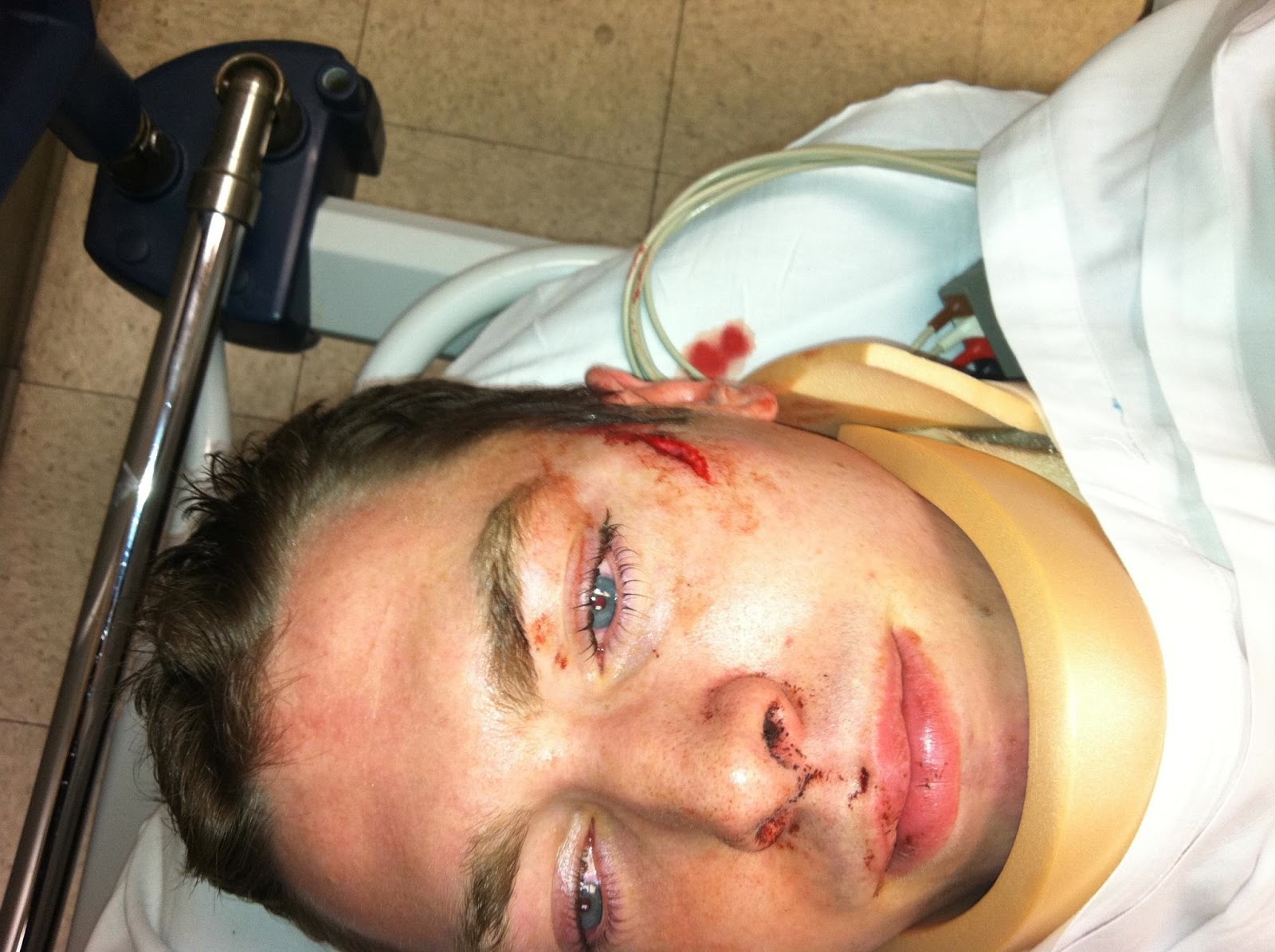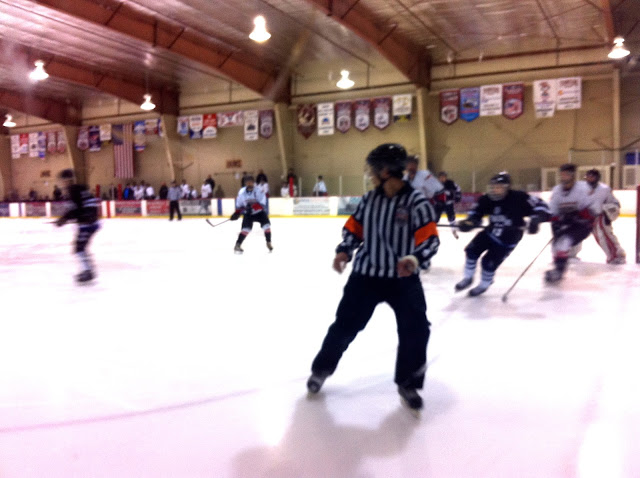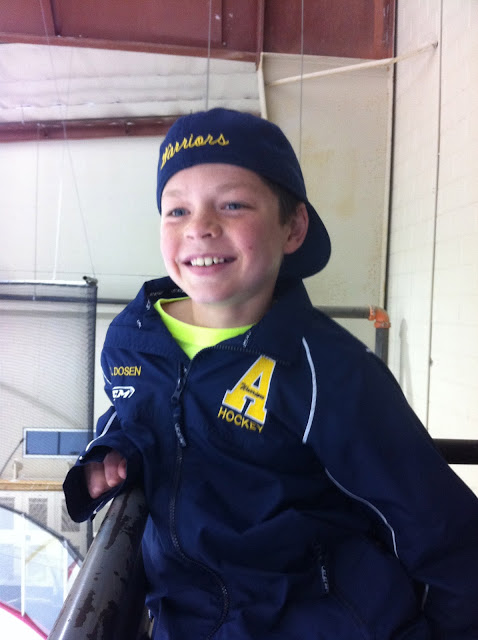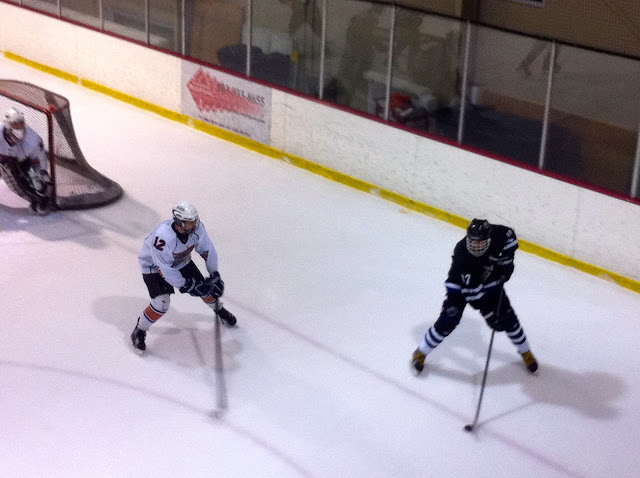13 Rules for Hockey Parents Everywhere...
1. Under no circumstances will hockey practice ever be cancelled. Ever. Even on days when school is cancelled, practice is still on. A game may be cancelled due to inclement weather because of travel concerns for the visiting team, but it would have to rain razor blades and bocce balls to cancel hockey practice at your local rink. It's good karma to respect the game.
2. Hockey is an emotional game and your child has the attention span of a chipmunk on NyQuil. The hockey coach will yell a bit during practice; he might even yell at your precious little Sparky. As long as there is teaching involved and not humiliation, it will be good for your child to be taught the right way, with emphasis.
3. Hockey is a very, very, very, very difficult game to play. You are probably terrible at it. It takes high skill and lots of courage, so lay off your kid. Don't berate them. Be patient and encourage them to play. Some kids need more time to learn how to ride the bike, but, in the end, everyone rides a bike about the same way. Your kids are probably anywhere from age 4-8 when they first take up hockey. They will not get a call from Boston University coach Jack Parker or receive Christmas cards from the Colorado Avalanche's director of scouting. Don't berate them. Demand punctuality and unselfishness for practice and games. That's it. Passion is in someone, or it isn't. One can't implant passion in their child. My primary motive in letting my kids play hockey is exercise, physical fitness and the development of lower-body and core strength that will one day land them on a VH1 reality show that will pay off their student loans or my second mortgage.
4. Actually, I do demand two things from my 10-year-old Squirt, Jackson. Prior to every practice or game, as he turns down AC/DC's "Big Jack," gets out of the car and makes his way to the trunk to haul his hockey bag inside a cold, Connecticut rink, I say, "Jack, be the hardest, most creative and grittiest worker ... and be the one having the most fun." That might be four things, but you know what I mean.
5. Your kids should be dressing themselves and tying their own skates by their second year of Squirt. Jack is 67 pounds with 0 percent body fat and arms of linguini, and he can put on, take off and tie his own skates. If he can, anyone can. I don't go in the locker room anymore. Thank goodness; it stinks in there.
6. Do not fret over penalties not called during games and don't waste long-term heart power screaming at the referees. My observational research reveals the power-play percentage for every Mite hockey game ever played is .0000089 percent; for Squirts, .071 percent. I prefer referees to call zero penalties.
7. Yell like crazy during the game. Say whatever you want. Scream every kind of inane instruction you want to your kids. They can't hear you. In the car ride home, ask them if they had fun and gently promote creativity and competiveness, but only after you take them to Denny's for a Junior Grand Slam breakfast or 7-Eleven for a Slurpee. Having a warm breakfast after an early morning weekend game will become one of your most syrupy sweet memories.
8. Whenever possible, trade in your kids' ice skates and buy used skates, especially during those growing years and even if you can afford to buy new skates every six months. Your kids don't need $180 skates and a $100 stick no matter what your tax bracket is. They will not make them better players.
9. Missing practice (like we stated above) or games is akin to an Irish Catholic missing Mass in 1942. We take attendance at hockey games very seriously. Last week, the Islanders' Brendan Witt was hit by an SUV in Philadelphia. Witt got up off the pavement and walked to Starbucks for a coffee, and then later played against the Flyers that night. Let me repeat that: BRENDAN WITT WAS HIT BY AN SUV ... AND PLAYED THAT NIGHT! Re-read that sentence 56 times a night to your child when they have a case of the sniffles and want to stay home to watch an "iCarly" marathon. By, the way Philadelphia police cited Witt for two minutes in jail for obstruction. Witt will appeal.
10. Teach your kids not to celebrate too much after a goal if your team is winning or losing by a lot. And by all means, tell them celebrate with the team. After they score, tell them not to skate away from their teammates like soccer players. Find the person who passed you the puck and tell him or her, "Great pass." We have immediate group hugs in hockey following a short, instinctive reaction from the goal scorer. I am proud of my boy for a lot of things, but I am most proud at how excited he gets when a teammate scores a goal. He is Alex Ovechkin in this regard.
11. There is no such thing as running up the score in hockey. This is understood at every level. It's very difficult to score goals and unexplainably exhilarating when one does. Now, if we get to 14-1, we may want to take our foot off the gas a tad.
12. Unless their femur is broken in 16 places, Mites or Squirts should not lie on the ice after a fall on the ice or against the boards. Attempt to get up as quickly as one can and slowly skate to the bench.
13. Do not offer cash for goals. This has no upside. Passion and love and drive cannot be taught or bought. I do believe a certain measure of toughness and grit can be slowly encouraged and eventually taught. Encourage your kid to block shots and to battle hard in the corners. It will serve them well in life.
11/10/2010, 4:17pm (CST) By John Buccigross
"My 13 simple rules for hockey parents everywhere", written by John Buccigross of ESPN.






























































